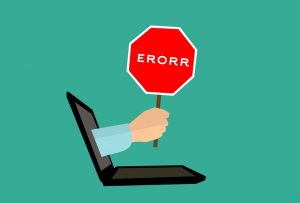Everyone makes mistakes. When you’re filling in forms or completing paperwork however, making mistakes can have fairly serious consequences. All DBS checks start with form filling, either online or on paper. If you make a mistake at this stage, it could delay your certificate. There are some mistakes which are more common than others – know what they are, and how to avoid them.
 Typos on DBS Checks
Typos on DBS Checks
If you’re completing the application online, it’s easy to make typos. Websites generally don’t highlight spelling mistakes in names or addresses, so it’s essential to take extra care when typing your details on the form. If you find it difficult to catch your own mistakes, then ask a friend or relative to look over your form before you hit the button to submit. If you choose to use a third party service to manage your application for you, they’ll usually include a proof-reading service and will check the details provided against your identity documents. Spelling your name one way on the form and another on your passport is going to cause confusion. Remember to include all of your middle names too, not just initials.
Another common mistake is with dates of birth – remember it’s the convention to write the day then the month rather than the month then the day. Get it wrong, and the form will be rejected. If you write 10/6 when your birthday is 6th October, the form will be rejected as the DBS will be looking for someone born on the 10th of June.
Incomplete Information
The other main error is not giving enough information. People don’t read the form properly, or assume that the detail they’ve provided will be enough. If the form asks for address history going back five years, make sure you give that. Don’t leave gaps in your address history without explanation. If the form asks about previous names, list all names which you’ve ever been known by, not just the most recent names. If you miss out information, there is every chance that your form will be sent straight back to you. Ask someone you trust to read the form to see if they can catch any mistakes. Third party companies have lots of experience in picking up small mistakes at this early stage and can point them out right away.
Declaring Convictions
The whole point of DBS checks is to see what convictions and cautions you have on your record. Many people think that they therefore don’t need to declare on the form convictions which they know about. Sometimes, people leave off old convictions because they can’t remember the exact date or month. Depending on the level of disclosure, you might not have to declare spent convictions. Get advice if you’re not sure about what you should list on your form. Employers won’t be expecting everyone to have a totally clear DBS check. They are more likely to be understanding if you’ve mentioned previous brushes with the law at interview stage.